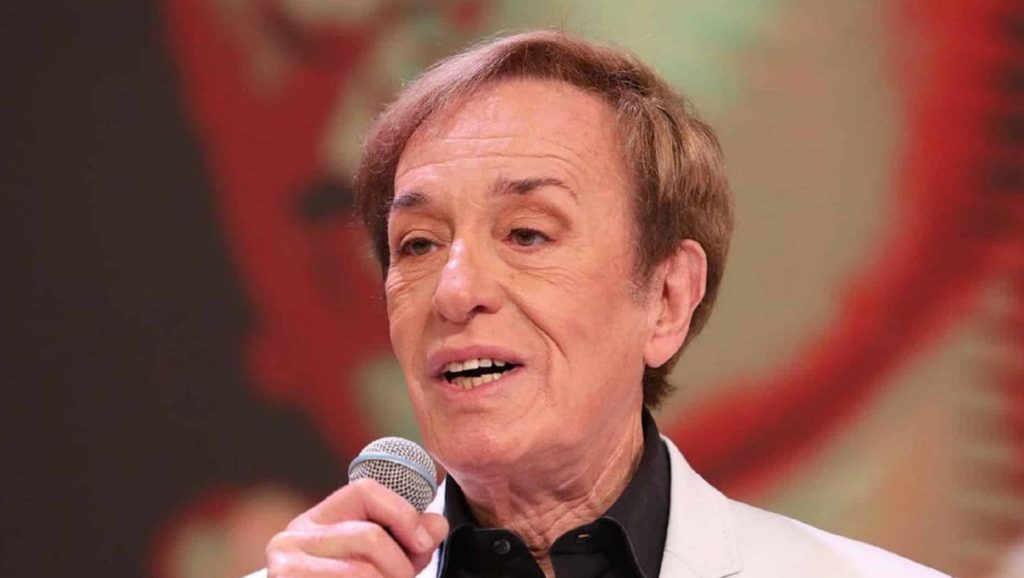António Calvário da Paz was born in Mozambique on the 17th of October 1938. He came to the Metropolis, more precisely to Portimão, at the age of 8. Then he goes to Lisbon in order to finish the 3rd high school course. He has singing lessons with Corina Freire, a former singer and his cousin grandmother.
He joins Emissora Nacional in 1957 after having applied for a contest but without having to go through the famous Artists Preparation Center. In 1960 he was acclaimed at the Festival da Canção Portuguesa, held in the city of Porto, with “Regresso”. He records the EP “O Papá e a Mamã” with Maria de Lourdes Resende which contains the themes “O Papa e a Mamã”, “Melodia de Natal” and “Amanhã Se Deus Quiser” which won the 1st Light Song Contest of Radiotelevisão Portuguesa .
In 1961 he won his first title of King of Radio. He collaborates again with Maria de Lourdes Resende in “Carnaval do Estoril”. It is also the year of “Oração de Amor” and “O Meu Chapéu”.
“Desse Amor Melhor” and “Perdão para Dois” are great successes in 1962. He receives the Oscar da Imprensa (in the first edition of the Casa da Imprensa Awards) for best male singer of that year.
In 1963, he made his theater debut with the great success of “Chapéu Alto”. He edits the albums “O Dia Mais Longo”, “Fado Hilário” and “Avé Maria dos Namorados”. He also records an album with Los Guaireños.
In 1964 he participates in the magazine “Lábios Pintados” where he interprets the theme “Tricana”. He was the first winner of the Grande Prêmio TV da Canção Portuguesa, with the song “Oração”, having represented Portugal, for the first time, in the Eurovision Song Contest, which took place in Denmark.
Still in 1964, he made his film debut in “Uma Hora de Amor”, directed by Augusto Fraga, where he starred with Madalena Iglésias. He records a version of “Sabor a Sal”.
He again participates in the Grande Prêmio TV da Canção, in 1965, with “Você Não Vê”, “Bom Dia” and “Por Causa Do Mar”. He records “Fados” and “Meu Coração da Madeira”. He also acts in the film “Rapazes de Táxis” by Constantino Esteves.
The song “Encontro Para Amanhã” is in 6th place at the Festival RTP da Canção in 1966. The film “Sarilho de Fraldas”, again with Madalena Iglésias, is one of the great successes of the year. He also participates in the magazine “Zero, Zero, Zé, Ordem para Pagar”.
He participates in the 1968 Festival RTP da Canção with “O Nosso Mundo”. It is also the year of the film “O Amor Desceu em Paraquedas” and the magazine “Esta Lisboa que Eu Amo” which premiered at the Teatro Monumental.
António Calvário and Simone de Oliveira record an EP with versions of the film “My Fair Lady”.
He represents Portugal at the I Festival da Canção Latina No Mundo, held in Mexico, where he gets the 4th place – the best European place. A single with the themes “Terra de Flores” and “Canção da Juventude” is edited.
He gets a big hit with “Chorona”.
In 1969 he was one of the producers of the film O Diabo Era Outro, with Milú, Nicolau Breyner and Hermínia Silvia, which turned out to be a financial disaster and forced him to perform in various circuses and other places, in order to be able to pay the costs resulting from that bad act investment.
In 1974 he recorded a version of the song “A Rosa Que Te Dei” by José Cid. With the 25th of April, he stopped singing on the stages he was used to, to sing in night-clubs and cabarets.
After a long period of absence, he returned in 1977 to the theater, on ABC, with the revues “Põe-te na Bicha” and “Direita Volver”. The first will result in a great success with “Mocidade, Mocidade”, by Nuno Nazareth Fernandes, music and lyrics by Carlos Coelho
In 1988 he released a single with the themes “Adeus Isabel” and “Santa Luzia”.
In the 90s, by the hand of Carlos Alfaiate and Luís Aleluia in their production company CARTAZ – Produção de Especçous, he returned to direct contact with the general public, carrying out an extensive tour throughout the country with several shows by Revista À Portuguesa where António Calvário sang his greatest hits and some unreleased.
The album “Canto Avé Maria” was released in 1997 by Strauss.
He returns to the studios and stages in 2000 with the CD “Volta” which includes the hit “Nem Sequer Sei O Teu Nome”.
In 2003, the biography “António Calvário – A Canção de Uma Vida” was published by journalist Luis Guimarães.
Celebrating 50 years of career, in 2008, a compilation is released by Farol with two unpublished songs (“I’m here” and “Só a cantor”, both by Ondina Santos and Vítor Talhas) and also the autobiography “Histórias da minha História “, edited by Guerra & Paz.






Their dedication reminds us of the beauty of perseverance and passion.